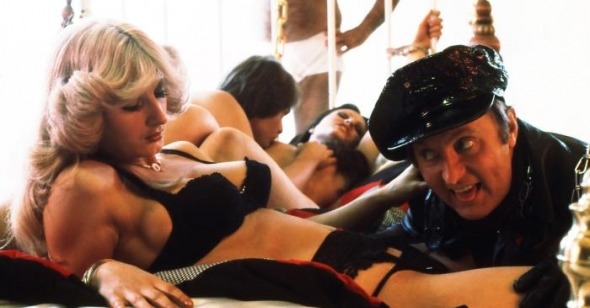Fast, Cheap, and Out of Control
by Michael Joshua Rowin
Not Quite Hollywood
Dir. Mark Hartley, Australia, Magnet Releasing
I may not be the best critic to review Not Quite Hollywood, Mark Hartley’s documentary about the Australian exploitation boom of the Seventies and Eighties: I know little to nothing about Australian cinema, let alone its schlocky genre movie fringes. However, I might also be exactly what the film’s looking for as a target audience: an impressionable cinephile who might use its survey of gratuitous nudity and ridiculous splatter as a springboard to discover treasures mostly unknown or forgotten in the U.S.
Hartley begins in the early Seventies, when a virtually nonexistent Australian film industry was awakened by more lenient censorship rules and greater federal funding—at the time whatever movies of interest were made there were from British directors working temporarily abroad such as Nicolas Roeg and Tony Richardson. Reserved, Hollywood-wannabe period films languished; more successful were crude, ribald cheapies that accurately captured the tenor of the time and perhaps a wild impertinence unique to the country. The first wave was exemplified by Stork, The Adventures of Barry McKenzie, and Alvin Purple, gross out T&A fests that unleashed the male id onscreen in all its tongue-wagging idiocy. A peak period soon arrived with more artistic fare (class conscious Sunday Too Far Away, literary adaptation My Brilliant Career), but also with films crasser, weirder, and more violent, titillating, and silly: Patrick, Roadgames, Turkey Shoot, and, of course, Mad Max.
This proud history is communicated through appropriate talking heads like John D. Lamond, the shameless exploitation legend who talks to the camera while inside a strip club; Quentin Tarantino, Australian film connoisseur; Brian Trenchard-Smith, the campy Brit director responsible for films like The Man from Hong Kong and Deathcheaters; and a host of actors, stuntmen, and miscellaneous crew crucial to the “movement.” Unfortunately Hartley tries to evoke the sugar-rush excitement of the Ozploitation with a rapid-fire mix of sound bites and needless 3D graphics (think The Kid Stays in the Picture) that quickly make Not Quite Hollywood a numbing experience and render full absorption of its crash course information impossible. Hartley fails to dig into the aspects of Australian society Ozploitation films may have reflected during the period—newly uninhibited sexuality, reckless car and biker cultures—as well as issues their productions inherently raised: highbrow versus lowbrow representations of the country, whether interloping Hollywood actors such as Jaime Lee Curtis should have been cast, the debatable merits of imitating American genre films in place of more indigenous filmic expressions. None of these are considered for more than a brief moment, and again, like the films it covers, Not Quite Hollywood remains fast but shallow.
But Hartley is mainly dying to show the mondo bizarre stuff these films were capable of, and he admirably succeeds in piquing interest. The interview subjects offer differing perspectives on whether Ozploitation was a cinema of irreverent subversion or easy profit margins and come more or less to the conclusion that the films at least offer something . . . different. The behind-the-scenes stories are predictably fun—several amusing ones are told of the prima donna antics of The Man from Hong Kong co-stars Jimmy Wang-Yu and George Lazenby—and, even better, Hartley unearths the bottom-of-the-barrel genius of films like Stunt Rock, a Trenchard-Smith whatzit combining the late-Seventies penchant for stuntman-centered action vehicles with Spinal Tap-level cock rock, or Fair Game, a variation on the crazed bikers subgenre which Tarantino dubs “a female Straw Dogs.”
Say what you will about QT, but the dude loves movies, and he perfectly hits upon the perverse pleasures of Fair Game with his insight that a good exploitation movie always contains an “Is this actually happening?” moment. One such moment occurs in Fair Game when the heroine is stripped and placed on a car as a human hood ornament. If this strikes your fancy, then Not Quite Hollywood is a perfect entryway to rarely charted transgressions from the land down under.
